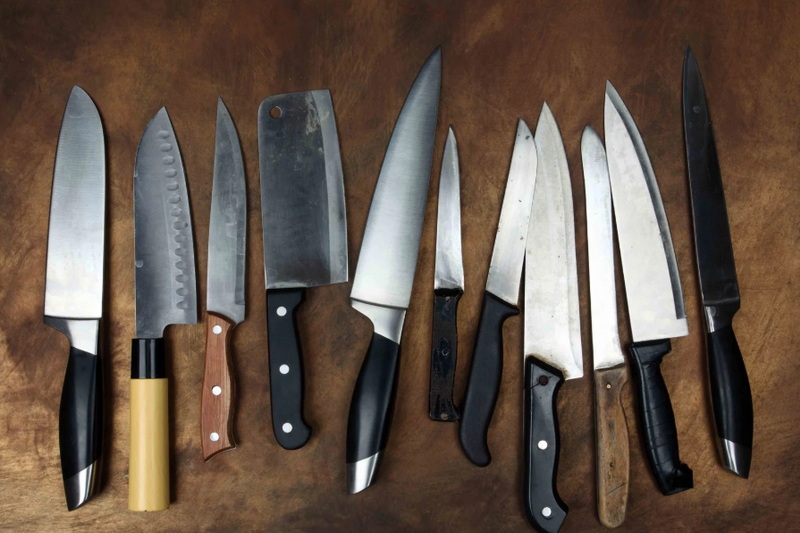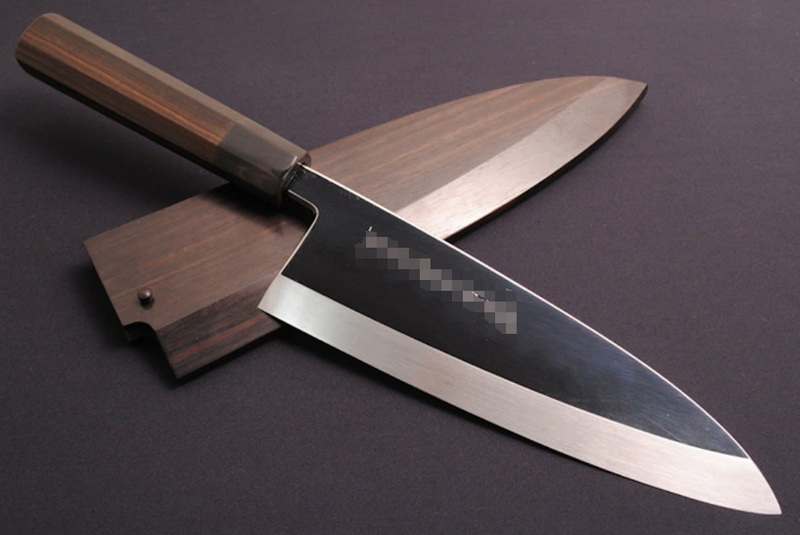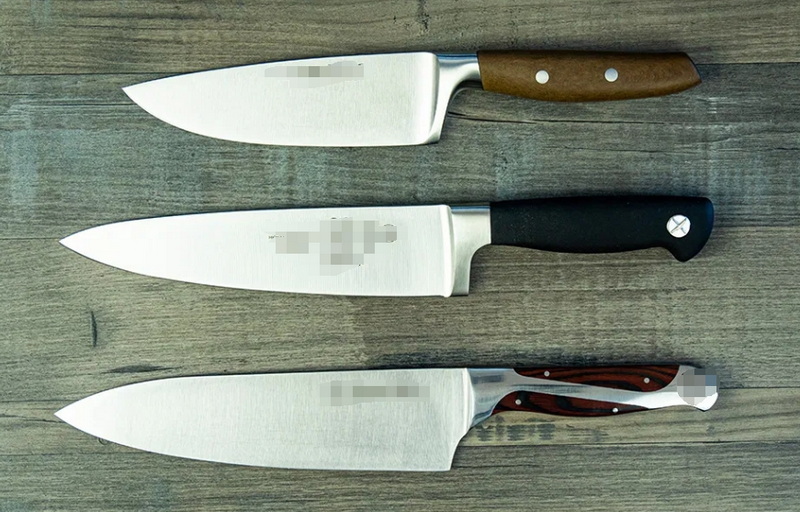

Views: 222 Author: Ella Publish Time: 2025-04-18 Origin: Site








Content Menu
● Understanding Knife Materials
● Sharpness and Edge Retention
● Durability: Which Knife Set Lasts Longer?
● Versatility and Everyday Use
● Environmental Impact and Sustainability
● User Experience and Ergonomics
● FAQ: Top 5 Questions About Ceramic vs Stainless Steel Knife Sets
>> 1. Are ceramic knives really sharper than stainless steel knives?
>> 2. Can ceramic knives be used for all kitchen tasks?
>> 3. Do stainless steel knives rust or corrode easily?
>> 4. Which knife set is easier to maintain—ceramic or stainless steel?
>> 5. How long do ceramic and stainless steel knives typically last?
Choosing the right knife set is a cornerstone of every kitchen. Among the most debated options are ceramic and stainless steel knives—each boasting unique strengths, weaknesses, and longevity claims. This comprehensive guide will explore the science, real-world performance, and practical considerations behind ceramic and stainless steel knife sets, helping you decide which truly lasts longer and best suits your culinary needs.

Knives are the backbone of any kitchen, and the debate between ceramic and stainless steel sets is ongoing. While ceramic knives are celebrated for their sharpness and edge retention, stainless steel knives have built a reputation for durability and versatility. But when it comes to longevity, which material truly stands the test of time?
- Material: Made from zirconium oxide (zirconia), a material much harder than steel.
- Properties: Extremely hard, non-porous, rust-proof, and lightweight.
- Common Uses: Precision slicing, fruits, vegetables, boneless meats.
- Material: An alloy of iron, carbon, and chromium, sometimes with added elements for enhanced properties.
- Properties: Tough, flexible, resistant to rust and corrosion, heavier than ceramic.
- Common Uses: All-purpose—chopping, slicing, dicing, cutting bones, frozen foods.
- Edge Retention: Ceramic blades are renowned for their sharpness and ability to retain an edge up to 10 times longer than steel.
- Hardness: On the Mohs scale, ceramic rates 8.2, while steel is around 4–6.
- Result: Less frequent sharpening, but when dull, require professional diamond sharpening.
- Edge Retention: Stainless steel knives are sharp but lose their edge faster, requiring regular honing and sharpening.
- Sharpening: Easily sharpened at home with common tools.
- Result: More maintenance, but easier to restore sharpness.
| Feature | Ceramic Knives | Stainless Steel Knives |
|---|---|---|
| Sharpness | Extremely sharp, long-lasting edge | Sharp, needs frequent honing |
| Edge Retention | 10x longer than steel | Dulls faster |
| Sharpening | Difficult, needs diamond tools | Easy, can be done at home |
- Lifespan: With proper care, ceramic knives can last many years, even a decade or more, due to their exceptional hardness and edge retention.
- Fragility: However, they are brittle—prone to chipping or breaking if dropped or used on hard foods (bones, frozen meat).
- Usage Limitation: Not suitable for heavy-duty tasks; best for slicing softer foods.
- Lifespan: Stainless steel knives are highly durable, able to withstand rough handling, impacts, and a wide range of kitchen tasks.
- Resilience: Less likely to chip or break, even if dropped.
- Versatility: Can handle everything from delicate slicing to chopping bones and frozen items.

- Cleaning: Non-porous, resists odors and bacteria, easy to clean by hand.
- Sharpening: Requires professional service or diamond-coated sharpeners.
- Storage: Must be stored carefully to avoid chipping (use blade guards or knife blocks).
- Cleaning: Rust-resistant, but should be dried after washing to prevent corrosion.
- Sharpening: Can be honed and sharpened at home with various tools.
- Storage: More forgiving—can be stored in most knife blocks or on magnetic strips.
- Best For: Slicing fruits, vegetables, and boneless meats.
- Limitations: Not suitable for chopping bones, frozen foods, or prying tasks.
- Weight: Lightweight, reducing wrist fatigue during repetitive tasks.
- Best For: All-purpose use—chopping, slicing, dicing, cutting through tough and frozen foods.
- Limitations: Heavier, which some users may find tiring, but provides better control and balance.
- Weight: Heavier, preferred by many chefs for control and stability.
| Feature | Ceramic Knives | Stainless Steel Knives |
|---|---|---|
| Versatility | Limited to soft foods | All-purpose, heavy-duty tasks |
| Weight | Lightweight | Heavier, more balanced |
| Hygiene | Non-porous, odor-resistant | Can transfer flavors if not cleaned |
- Ceramic Knife Sets: Generally affordable, with prices ranging from $75 to $200 depending on brand and number of pieces.
- Stainless Steel Knife Sets: Wide price range, from budget-friendly to high-end professional sets ($50 to $500+).
- Long-Term Value: Ceramic knives may last longer between sharpenings, but are more likely to need replacement if chipped. Stainless steel knives may require more frequent sharpening but are less likely to break, offering better long-term durability for heavy use.
- Safety: Extremely sharp; must be handled with care. Brittle nature means they can break and create sharp fragments if dropped.
- Hygiene: Non-porous, does not absorb food odors or bacteria, making it a hygienic choice.
- Safety: Sharp, but less likely to break. Must be kept dry to prevent rust, especially with high-carbon steel.
- Hygiene: Generally safe, but can transfer flavors or odors if not cleaned thoroughly.
- Production: Manufacturing ceramic knives requires high temperatures and energy, but they do not corrode or rust, reducing the need for replacements.
- Disposal: Not recyclable in most municipal systems; broken ceramic can be hazardous in landfills.
- Longevity: If handled with care, their long lifespan can offset the environmental impact of production.
- Production: Stainless steel is energy-intensive to produce but is widely recycled.
- Disposal: Old stainless steel knives can be recycled, reducing landfill waste.
- Longevity: Their ability to be sharpened and repaired extends their usable life, making them a sustainable choice for many kitchens.
- Handling: Lightweight, which can reduce fatigue, especially for users with smaller hands or those who cook for long periods.
- Grip: Often come with ergonomic handles, but the lightness may reduce the sense of control for some users.
- Balance: The blade-to-handle balance is different from steel, which may require an adjustment period.
- Handling: Heavier, providing a sense of stability and control favored by professional chefs.
- Grip: Wide variety of handle designs and materials, including wood, plastic, and composite.
- Balance: Well-balanced for most tasks, making them suitable for both precision work and heavy-duty chopping.
- Ceramic knives excel in sharpness and edge retention, staying razor-sharp for years with minimal maintenance. However, their brittleness means they can chip or break easily if mishandled or used on hard foods. When treated with care and used for appropriate tasks, a ceramic knife can last up to 10 times longer than a steel knife before needing sharpening.
- Stainless steel knives are the workhorses of the kitchen. While they require more frequent sharpening, they are highly durable, versatile, and forgiving of rough handling. For heavy-duty tasks and long-term resilience, stainless steel knives typically outlast ceramic knives in real-world kitchen environments.
Bottom Line:
If your priority is a razor-sharp edge for delicate slicing and you can handle your tools with care, ceramic knives offer impressive longevity. For everyday versatility, durability, and ease of maintenance, stainless steel knives are the better long-term investment for most kitchens.

Yes, ceramic knives are typically sharper than stainless steel knives out of the box and retain their edge much longer due to the hardness of zirconium oxide. However, when they do dull, sharpening them is more difficult and often requires professional tools.
No, ceramic knives are best for slicing fruits, vegetables, and boneless meats. They are not suitable for chopping bones, frozen foods, or tasks that involve prying or twisting, as this can cause them to chip or break.
Most modern stainless steel knives are resistant to rust and corrosion, especially when properly cleaned and dried after use. High-carbon steel knives, however, can rust if not maintained, so regular cleaning and drying are recommended.
Stainless steel knives are easier to maintain overall. They can be sharpened at home with common tools and are less likely to break. Ceramic knives require careful handling and professional sharpening, but they don't rust and are easy to clean.
With proper care, ceramic knives can last many years, potentially a decade or more, especially if used only for soft foods. Stainless steel knives, with regular sharpening and maintenance, can last for decades and are less likely to break from accidental drops or misuse.
[1] https://dalstrong.com/blogs/news/ceramic-knife-vs-stainless-steel-knife
[2] https://martorusa.com/blog/ceramic-blades-vs-steel-blades.html
[3] https://kitchpulse.com/ceramic-knives-vs-steel-knives-pros-and-cons/
[4] https://cutlery.kyocera.com/knife-sets
[5] https://sabatierknifeshop.com/products/8-pc-kitchen-knives-set-with-color-choice
[6] https://www.sliceproducts.com/pages/ceramic-vs-stainless-steel-knives
[7] https://infinitalab.com/steel/stainless-steel-vs-ceramic-knife-set-which-cuts-above-the-rest/
[8] https://dalstrong.com/blogs/news/ceramic-knives
[9] /are-stainless-steel-or-ceramic-knives-better.html
[10] https://www.shopberghoff.com/products/1304003
[11] https://aikidosteel.com/products/aikido-signature-7-piece-set
[12] https://agarolifestyle.com/blogs/blogs-listing/stainless-steel-vs-ceramic-knife-set
[13] https://www.youtube.com/watch?v=yp8JYlNXP_Y
[14] /ceramic-vs-stainless-steel-kitchen-knife-which-is-right-for-you.html
[15] /ceramic-vs-stainless-steel-kitchen-knife-which-is-right-for-you.html
[16] https://www.reddit.com/r/chefknives/comments/chqztw/what_are_the_pros_and_cons_of_ceramic_knives/
[17] https://www.knivesandtools.com/en/ct/ceramic-knives.htm
[18] https://oishya.com/journal/ceramic-knives-vs-steel-knives-pros-cons/
[19] https://www.carawayhome.com/blog/ceramic-cookware-stainless-steel
[20] https://www.thearmorylife.com/forum/threads/ceramic-vs-steel-knives-is-one-better-or-are-they-just-different.19008/
[21] https://blog.sliceproducts.com/blog/ceramic-knives-vs-steel
[22] https://cooking.stackexchange.com/questions/20900/should-i-buy-steel-or-ceramic-knives
[23] https://www.walmart.com/ip/Carote-12Pcs-Kitchen-Knife-Set-with-Blade-Guards-White-Granite-Ceramic-Knife-Stainless-Steel/5337672505
[24] https://cutlery.kyocera.com/2-piece-innovationwhite-ceramic-knife-set-55-santoku-3-paring-with-2-knife-guards
[25] https://www.istockphoto.com/photos/ceramic-knife
[26] https://www.shutterstock.com/search/knife-set
[27] https://za.pinterest.com/augidefreitas/knives-ceramic/
[28] https://stock.adobe.com/search/images?k=%22ceramic+knife%22
[29] https://www.calphalon.com/cutlery/cutlery/
[30] https://www.youtube.com/watch?v=QtWuXR8_EII
[31] https://www.shopberghoff.com/products/berghoff-entity-6pc-stainless-steel-knife-block-set
[32] https://www.youtube.com/watch?v=yp8JYlNXP_Y
[33] https://www.walmart.com/ip/CAROTE-14-Pieces-Knife-Set-with-Wooden-Block-Stainless-Steel-Knives-Dishwasher-Safe-with-Sharp-Blade-Ergonomic-Handle-Forged-Triple-Rivet-Pearl-Black/8721923776
[34] https://www.youtube.com/watch?v=N8PBIv1f0lY
[35] https://www.youtube.com/watch?v=r4FAx1K1ATI
[36] https://www.youtube.com/watch?v=AVYjxT8_Aj4
[37] https://www.youtube.com/watch?v=eF0I67nHgQQ
[38] https://www.youtube.com/watch?v=dxCHlywiseo
[39] https://www.youtube.com/watch?v=RDAyxALmlwg
[40] https://www.youtube.com/watch?v=FFEgg7OWsUk
[41] https://capecodcutlery.com/care-and-cleaning-of-knives/
[42] https://www.shenzhenknives.com/pages/faq
[43] https://www.sargeknives.com/faq
[44] https://www.reddit.com/r/AskCulinary/comments/17bqgy/are_ceramic_knives_worth_considering/
[45] https://www.mercerculinary.com/preview/faqs/
[46] https://cutlery.kyocera.com/faq
[47] https://blog.boydmetals.com/5-frequently-asked-questions-about-stainless-steel
[48] https://blog.isb-group.com/ceramic-blades-your-questions-answered
[49] https://www.bladesmithsforum.com/index.php?%2Ftopic%2F36510-some-stainless-questions%2F&do=findComment&comment=354716
[50] https://madeincookware.com/blogs/ceramic-vs-stainless
[51] https://corelle.com/pages/chicago-cutlery
[52] https://www.youtube.com/watch?v=wfKxldapLPY
[53] https://www.sliceproducts.com/pages/ceramic-vs-stainless-steel-knives
[54] https://www.coldsteel.com/faqs/
[55] https://elementknife.com/pages/common-questions-about-kitchen-knives
What's the Difference Between a Chef Knife and a Kitchen Knife?
What's the Difference Between a Chef Knife and a Gyuto Knife?
What's the Difference Between an 8-Inch and 10-Inch Chef Knife?
What's the Difference Between Carbon Steel and Stainless Steel Chef Knives?
What's the Difference Between Western and Japanese Chef Knives?
Knife Set vs Utility Knife Collection: Which One Is More Practical?